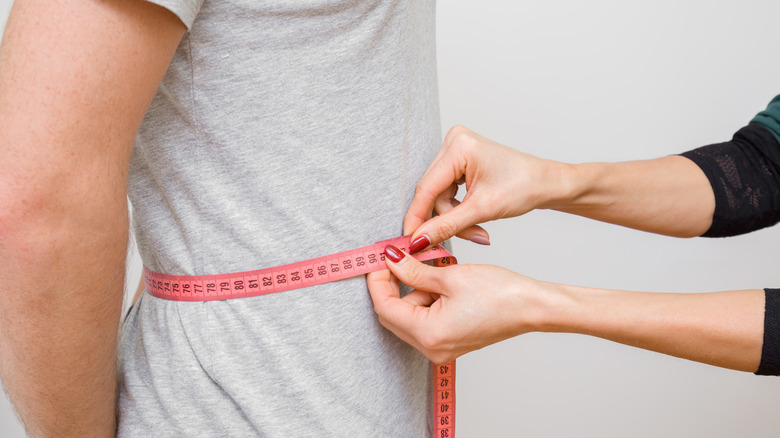What Is The Average Weight For A Man In The U.S.?
Between the constant ads featuring edited images of flawless models, the lack of body diversity in movies, and the stunning social media influencers with flat stomachs and toned legs all over social media, it's no secret that many women struggle with body image issues. However, fewer people talk about how men also feel insecure about their bodies. According to WebMD, between 20% and 40% of surveyed men don't like something about their appearances, such as how much they weigh, as they don't feel like they have the men's perfect body types.
While weight is just a number, and people of all genders shouldn't obsess over it, it's normal to want to weigh yourself sometimes if you're curious about exactly how much you weigh. Healthline noted that you should only weigh yourself one morning per week but be sure to stop if it makes you feel anxious or affects your relationship with food. Since there are so many different body types, people of all genders may feel curious about the average weight in the U.S.
The average man in the US weighs 197.9 pounds
According to Healthline, the average weight for men in the U.S. is just under 200 pounds, standing slightly above 5'9. More specifically, men between 20 and 39 years old weigh an average of 196.9 pounds, men aged between 40 and 59 have an average weight of 200.9 pounds, and men above age 60 weigh an average of 194.7 pounds. Additionally, Healthline explained that although the typical weight for an American man who stands at the average 5'9 height is around 200 pounds, the healthy weight range for a man of this height is between 125.3 and 168.6. Thus, it seems that many American men are at least 30 pounds over the healthy weight range for their heights, so being overweight is common in the U.S.
Furthermore, Healthline noted that the average weight for a woman in the U.S. is around 170 pounds, with an average height of about 5'4.
How to lose weight healthily
If you're one of the many people who weigh above the average U.S. number, you should first and foremost remember not to feel bad about yourself. Everyone has different body types, and you shouldn't compare yourself to others, especially when looking on social media or watching TV. Furthermore, you should never try to skip meals or starve yourself in hopes of losing weight. However, if you're looking to get lighter, Men's Health explained some healthy ways to lose weight.
Some of Men's Health's suggestions for losing weight include; setting a specific goal, eating less processed meals and more greens, working out, eating breakfast, avoiding fried foods, eating smaller meals, and surrounding yourself with healthy people. Additionally, Medical Transformation Center noted some more eating tips for losing weight. Some of their suggestions include adding more protein to your meals, using vinegar when cooking, eating healthier fats like salmon, drinking lots of water, and adding more fiber to your food intake.
Tips for gaining weight
While people traditionally think of losing weight when talking about how they want to change their bodies, many people would like to gain weight, especially if they're underweight. Although it may be your first instinct to eat as much junk food as you can to gain some pounds, this isn't a healthy method of gaining weight. According to Healthline, some strategies for healthy weight gain include eating a minimum of three meals daily, avoiding filling up on water, drinking milk, eating larger portions, and avoiding smoking.
If your goal is to become more muscular, Nerd Fitness noted some exercises that you should try. Some of these workouts include squats, bench presses, planks, deadlifts, chin-ups, and reverse crunches. Anyone looking to not only gain weight but bulk up as well should explore these exercises!
But above all else, whether you're trying to lose weight or gain weight, you should never beat yourself up over the number on your scale.



